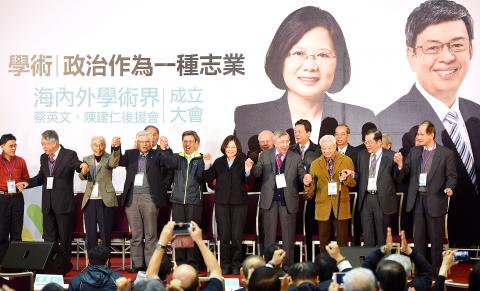Democratic Progressive Party (DPP) presidential candidate Tsai Ing-wen (蔡英文) and DPP vice-presidential candidate Chen Chien-jen (陳建仁) yesterday vowed to keep government intervention out of academia if elected to office, as the pair took part in the inauguration of an academic supporters’ club in Taipei.
Initiated by 1,688 Taiwanese academics across the world, the Tsai and Chen academic supporters’ club was officially inaugurated at a ceremony in Taipei, attended by more than 300 people.
In a speech to the academics, Tsai said that both herself and Chen have worked in the academic field, and they know how important it is to protect academic independence and freedom if elected, since she has seen many academics prosecuted for holding different political views from the government, only to be found not guilty by the end.

Photo: Lo Pei-der, Taipei Times
“Therefore I guarantee you that, I will not allow such things to happen anymore,” Tsai said. “My government will be one that gives maximum freedom and independence to academics, so that all of you may focus on doing your research. You may monitor the government in the harshest way and give us your teachings, without having to fear that you will be politically persecuted.”
Tsai also said that when selecting government officials, professionalism and ability — not political affiliation — would be the only consideration.
In a statement, the academics said that they chose to give their support to Tsai because “over the past seven-and-a-half years, the Chinese Nationalist Party [KMT] government has taken Taiwan into the double crises of a setback in democracy and recession in the economy.”
“Moreover, the economic development strategy of over-reliance on China has sacrificed the nation’s independence and dignity, leading to the hollowing out of industries, downgrading of Taiwan in the international community, slowing down of economic development and widening of the gap between the wealthy and the poor,” the statement said. “The people have lost their perspective, they cannot see a direction for the future, and they are trapped in collective anxiety.”
Su Yu Mei-chin (蘇余美津), wife of the late National Taiwan University law professor Su Chun-hsiung (蘇俊雄), who was one of Tsai’s teachers, said that Tsai has been a mature person who has always kept a low key.
“She [Tsai] has led the DPP out of the control by faction leaders within the party, and solved the DPP’s indebtedness,” Su Yu said. “My husband and I are both proud of having such a student, and we expect her to become Taiwan’s Angela Merkel [German Chancellor], to lead Taiwan forward.”
The club was first proposed by former minister of health Lee Ming-liang (李明亮), with endorsements from academics not only in Taiwan, but also from the US, Canada, the UK, Australia, New Zealand, Japan and South Korea.
Notably, TransWorld University President Hsu Shu-hsiang (許舒翔), who is former KMT legislator Hsu Shu-po’s (許舒博) brother and former KMT Yunlin County commissioner Hsu Wen-chih’s (許文志) son, were among those who signed the endorsement.

The Coast Guard Administration (CGA) yesterday said it had deployed patrol vessels to expel a China Coast Guard ship and a Chinese fishing boat near Pratas Island (Dongsha Island, 東沙群島) in the South China Sea. The China Coast Guard vessel was 28 nautical miles (52km) northeast of Pratas at 6:15am on Thursday, approaching the island’s restricted waters, which extend 24 nautical miles from its shoreline, the CGA’s Dongsha-Nansha Branch said in a statement. The Tainan, a 2,000-tonne cutter, was deployed by the CGA to shadow the Chinese ship, which left the area at 2:39pm on Friday, the statement said. At 6:31pm on Friday,

The Chinese People’s Liberation Army Navy’s (PLAN) third aircraft carrier, the Fujian, would pose a steep challenge to Taiwan’s ability to defend itself against a full-scale invasion, a defense expert said yesterday. Institute of National Defense and Security Research analyst Chieh Chung (揭仲) made the comment hours after the PLAN confirmed the carrier recently passed through the Taiwan Strait to conduct “scientific research tests and training missions” in the South China Sea. China has two carriers in operation — the Liaoning and the Shandong — with the Fujian undergoing sea trials. Although the PLAN needs time to train the Fujian’s air wing and

The American Institute in Taiwan (AIT) put Taiwan in danger, Ma Ying-jeou Foundation director Hsiao Hsu-tsen (蕭旭岑) said yesterday, hours after the de facto US embassy said that Beijing had misinterpreted World War II-era documents to isolate Taiwan. The AIT’s comments harmed the Republic of China’s (ROC) national interests and contradicted a part of the “six assurances” stipulating that the US would not change its official position on Taiwan’s sovereignty, Hsiao said. The “six assurances,” which were given by then-US president Ronald Reagan to Taiwan in 1982, say that Washington would not set a date for ending arm sales to Taiwan, consult

A Taiwanese academic yesterday said that Chinese Ambassador to Denmark Wang Xuefeng (王雪峰) disrespected Denmark and Japan when he earlier this year allegedly asked Japan’s embassy to make Taiwan’s representatives leave an event in Copenhagen. The Danish-language Berlingske on Sunday reported the incident in an article with the headline “The emperor’s birthday ended in drama in Copenhagen: More conflict may be on the way between Denmark and China.” It said that on Feb. 26, the Japanese embassy in Denmark held an event for Japanese Emperor Naruhito’s birthday, with about 200 guests in attendance, including representatives from Taiwan. After addressing the Japanese hosts, Wang